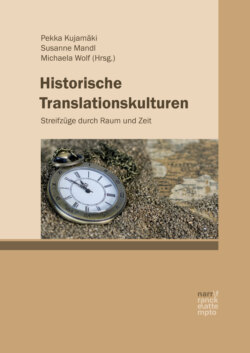Читать книгу Historische Translationskulturen - Группа авторов - Страница 40
3.3 Welsh
ОглавлениеDuring the mid-nineteenth century, translations from English into Welsh, though considerably fewer than translations from Welsh into English, had evolved from mainly religious texts (e.g. Calvinist texts translated from English or German into Welsh) to more secular texts. Much of the literature on Welsh translation in the nineteenth century focuses on mid-century texts. Literary translation from Welsh into English had gained popularity a century earlier, when an interest in Celticism was prevalent among English writers. Although this initial interest eventually subsided somewhat as Welsh was not seen to be as “ancient” as other Celtic languages due to its widespread presence in Wales, a clear interest in Welsh literature remained (Gramich 2000: 1493), with a sustained period of translation into English emerging in the nineteenth century for the first time. One translation which was particularly well-received in Wales, but also internationally was Lady Charlotte Guest’s 1849 translation into English of The Mabinogion, a collection of Welsh tales first written down in the fourteenth century. Guest’s approach to translation involved combining her own knowledge of the Welsh language and “antique” prose style with the work of the scholars who assisted her by producing very literal translations of the original (ibid.). Her versions of the tales are very accessible and still read today.
A number of contrasting trends in Welsh translation can be seen around the time of the Celtic Revival. In the late nineteenth and early twentieth centuries, translations of Medieval Welsh literature were quite common, with translators often adopting archaic, Romantic language in an effort to present the translations in the same antique or perceived “mystic” light as the originals. This changed in several ways with the foundation of the University of Wales in 1893. Translations were produced for scholars of Welsh literature, which was taught through English, and so, the translations tended to be quite literal (Miguélez-Carballeira et al. 2016b: 129). At the end of the century, however, there was a move towards translating contemporary Welsh-language poetry by translators such as AP Graves and Edmund O Jones. While such work indicated new interest in current Welsh culture, some translators attempted to minimise the difference between Welsh and English, producing nativised or “domesticating” translations (Venuti 2008). Constantine (2009) observes that this may partly be a result of the “cultural insecurity” that followed the 1847 Blue Books Report, citing Jones’ Welsh Lyrics of the Nineteenth Century (1896) as an example of the English-language reader receiving “a milder (and much meeker) dose of Wales”. Reynolds (2005: xiii) suggests that this inferiority complex could be traced back to the previous century: “There was no Welsh university, the bardic order had long since collapsed, and though Wales sustained a vibrant folk culture, the educated, and Anglicized, elite looked to England for instruction in all matters.”
In the early twentieth century there was “a renewed burst of translating activity”, which Gramich suggests may have been partly due to the Irish literary Renaissance (Gramich 2000: 1493), with anthologies still in the majority. Alfred Perceval Graves, an Irishman with an interest in Welsh culture, translated Welsh Poetry Old and New (1912), and a collection of George Borrow’s translation work, Welsh Poems and Ballads was published in 1915 by Ernest Rhys.
| Welsh – Overview What was translated: – More common to translate out of Welsh – Ancient and Medieval literature – Mainly anthologies: poetry, tales and legends – Contemporary literature to an extent Reasons for translation activity: – Revive Welsh literature and culture – Disseminate Welsh literature and culture in Wales and internationally – Scholarly interest in Celticism Translation strategies: – Literal translations – Use of archaisms and Romantic language to replicate antiquity and supposed mysticism of original texts – Nativising Translators: – George Borrow – AP Graves – Edmund O Jones Aim/Outcome: – Interest in contemporary Welsh culture |
